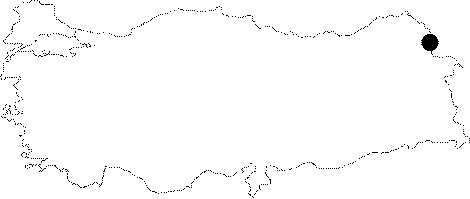|
©The Archaeological Settlements of Turkey - TAY Project
|
|
|
|
|
|
Ani |
|
|
For site maps and drawings please click on the picture...  |
For photographs please click on the photo...  |
|
Type:
|
Single Findspot |
|
Altitude:
|
1480 m |
|
Region:
|
Eastern Anatolia |
|
Province:
|
Kars |
|
District:
|
Merkez |
|
Village:
|
Ocakli |
|
Investigation Method:
|
Survey |
|
Period:
|
AP |
|
|
|
 |
|
| Location: This open-air site is 42 km (as the crow flies) east-southeast of the city of Kars. It lies northeast of the district of Digor; by the caves near the historic Ani ruins and close to the stream. The village of Ocakli (Ani). |
| Geography and Environment: The streamlet mentioned by Kökten springs from the eastern slopes of 2;670 m high Mount Alaca and flows by the Ani ruins where it joins Arpaçay. Although he does not describe them; Kökten informs us of the existence of nearby caves. Indeed; a 1:100;000 map indicates that caves are abundant in this area. It is not reported whether the finds are surface finds. |
| History: |
| Research and Excavation: One Palaeolithic tool was found in I.K. Kökten's 1942 survey of the area around the Ani ruins. |
| Stratigraphy: |
| Small Finds: The tool Kökten found was a basalt biface handaxe; 10.7x7.7x2.5 cm in size. Although Kökten believes that the general form suggests that the biface is Chelléen (Abbevillien); the natural abrasion of this biface has made it difficult to date. The abrasion is probably caused by natural processes which carried the tool to its provenience from a distant location. The flanks of Mount Alaca to the west are a possible point of origin. |
| Remains: |
| Interpretation and Dating: |